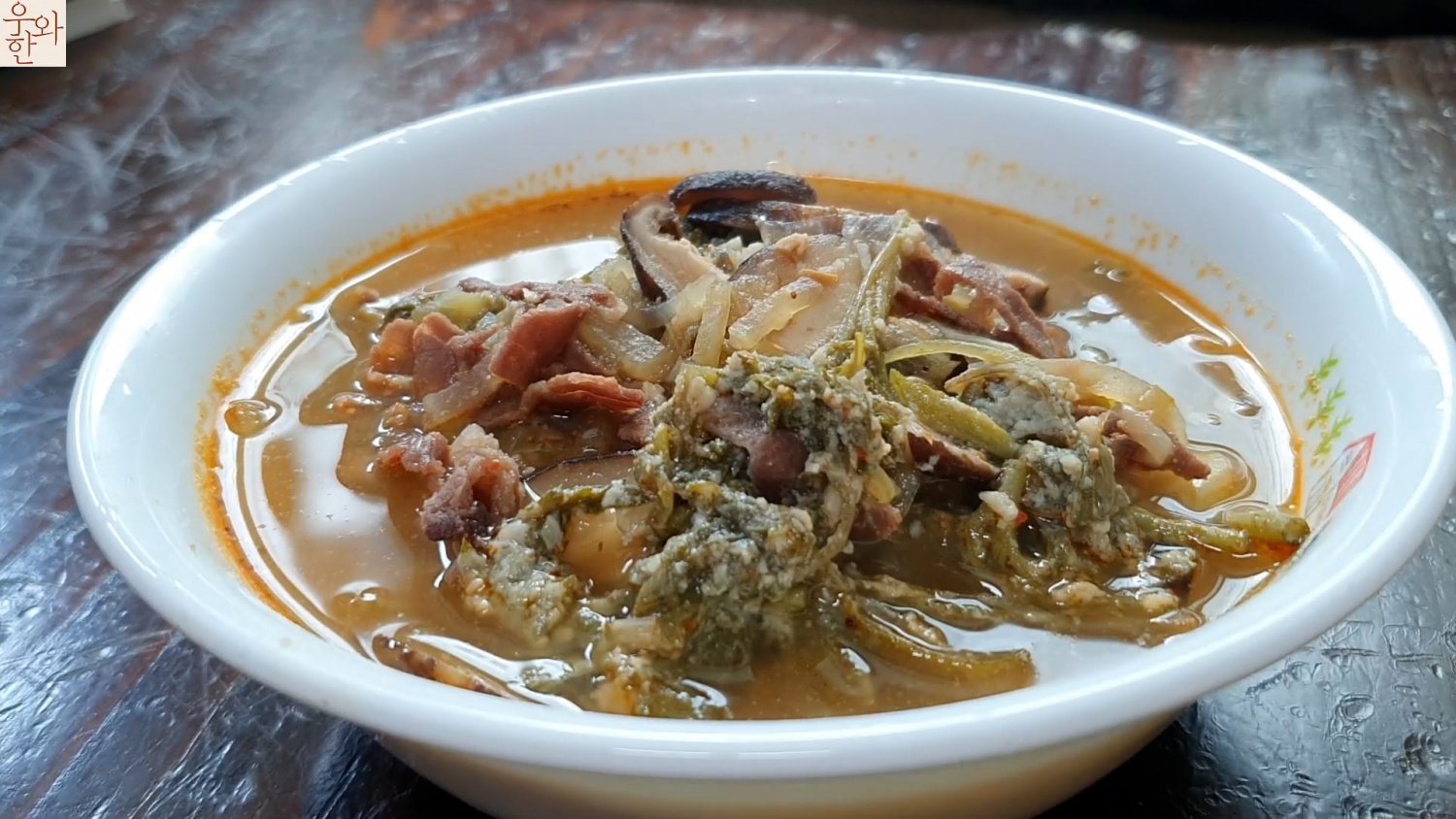A Healing Mugwort Soup (Ssukguk) Filled with Spring’s Aroma
How to Make Delicious Natural Mugwort Soup for Beginner Cooks

As I’ve grown older, turning 40, my palate has changed, making me yearn for the comforting flavors of my childhood. I never appreciated the taste of dishes like this, nor had I ever tried my mother’s mugwort soup before – a regret that truly touches my heart. This healing dish has brought a profound sense of comfort and warmth. Experience the deep, savory flavor of mugwort soup that I’ve only come to understand and cherish as an adult.
Ingredients- Fresh mugwort (ssuk) 3 handfuls (generous)
- Dried shiitake mushrooms 1 handful (about 5-6 mushrooms)
- Beef (thinly sliced, for bulgogi or shabu-shabu) 200g
- Radish (mu) 1 piece, about 2cm thick
- Onion 1/2
- Green onion (scallion) 1/2 stalk
- Flavorful soybean paste (mat-doenjang) or soybean paste (doenjang) 2 Tbsp
- Raw soybean powder 3 Tbsp
- Minced garlic 1 Tbsp
- Korean soup soy sauce (guk-ganjang) 3 Tbsp
Cooking Instructions
Step 1
Gently wash the fresh mugwort thoroughly under running water several times to remove any dirt or debris. Afterward, place it on a colander to drain the excess water. It’s best to use the tender leaves and stems of the mugwort.

Step 2
Soak the dried shiitake mushrooms in lukewarm water for about 30 minutes until they become soft and pliable. Once rehydrated, remove the tough stems and slice the mushroom caps into bite-sized pieces.

Step 3
Prepare the beef by thinly slicing it into strips approximately 0.7cm thick. Using thinly sliced beef, such as for bulgogi or shabu-shabu, allows the flavors to infuse beautifully into the broth and results in a tender texture.

Step 4
Slice the radish thinly, about 0.3cm thick, either into small rectangles or fine julienne strips. The radish will add a refreshing, clean flavor to the soup.

Step 5
Peel the onion and slice it thinly into strips. The natural sweetness of the onion will enrich the overall flavor of the broth.

Step 6
Wash and finely chop the green onion.

Step 7
Pour about 1.5 to 2 liters of fresh water into a deep pot. Using filtered water or purified water is recommended for a clear and refreshing broth.

Step 8
Add the prepared sliced radish to the pot first. This will form the base for the soup’s refreshing taste.

Step 9
Add 2 tablespoons of flavorful soybean paste (mat-doenjang) or regular soybean paste (doenjang) and dissolve it completely in the water without any lumps. The savory depth of the soybean paste will harmonize wonderfully with the mugwort’s unique aroma.

Step 10
Add the thinly sliced beef to the broth. As the beef cooks, it will impart its rich flavor, deepening the soup’s taste.

Step 11
Add the rehydrated shiitake mushrooms. Cover the pot and bring it to a boil over medium heat until it simmers gently. Allow the ingredients to meld their flavors into the broth.

Step 12
In a separate bowl, place the cleaned mugwort. Add 3 tablespoons of raw soybean powder and gently massage it into the mugwort with your hands until evenly coated. This step helps to mellow any bitterness from the mugwort and adds a pleasant nuttiness.

Step 13
Once the soup is simmering, add 1 tablespoon of minced garlic, followed by the sliced onion and green onion. Finally, add 3 tablespoons of Korean soup soy sauce (guk-ganjang) to season. Adjust with salt if needed, according to your preference.

Step 14
Carefully add the mugwort that has been coated with the soybean powder into the simmering soup. Be mindful not to overcook the mugwort after adding it.

Step 15
Simmer for a few more minutes until the mugwort is tender. Your fragrant and savory Healing Mugwort Soup is now ready! It’s best enjoyed hot.



